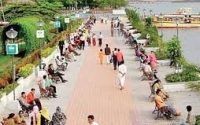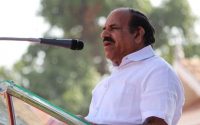Kerala on high alert ahead of SC verdict on Sabarimala review petitions.
Source – hindustantimes.com
Kerala Chief Minister Pinarayi Vijayan said Wednesday that his government would implement the Supreme Court order on Thursday on a bunch of review petitions questioning its September 2018 order which allowed women of all ages to worship at the Sabarimala Temple even as the administration made elaborate security arrangement for the pilgrimage season at the hill top shrine.
The government has strengthened security while political parties, right wing outfits and devotees are keeping their fingers crossed about the apex court’s verdict as the temple prepares to open for the annual three-month pilgrimage season on Saturday.
Last year the state had witnessed widespread protests and many shutdowns after the verdict on September 28.
Police have stepped up vigil in Pathanamthitta district where the famed temple is situated and have planned an elaborate security arrangement for the pilgrimage season. Additional DGP Shaikh Darvesh Saheb will oversee the deployment of 10,200 policemen at the temple and two base camps. The state government said it will implement the verdict in letter and spirit whether it is supportive or against the earlier judgment.
“We have made it clear we will go by what the apex court says,” said Chief Minister Pinarayi Vijayan in the state assembly on Wednesday.
But opposition Congress and BJP said they will take measures to protect the age-old custom if the review verdict goes against them.
“We stick to our decision that if it goes against our custom and belief we will bring legislation after coming to power,” said Opposition leader Ramesh Chennithala. “We are with the devotees. We hope hurt feelings of devotees will be assuaged by the court,” said BJP general secretary M T Ramesh adding the party expected a favorable verdict like the one on the Ram temple in Ayodhya.
Many devotees, who have called for the return of the status quo at the temple, are hopeful following the top court’s verdict in the Ram Janmabhoomi-Babri Masjid title dispute case that paved the way of construction of the temple in Ayodhya and declared deity Ram Lalla a juristic person. A juristic person is a legally recognized non-human legal entity entitled to rights like a human being. They say like Ram Lalla, Lord Ayyappa has certain rights that have to be respected.
“The verdict on Ram Lalla gives much hope for us. Lord Ayyappa is also a juristic person enjoying certain rights,” said P Madhu, a worker of the Sabarimala Karma Samiti, an apex body of many Hindu bodies formed during last year’s protest.
Both the Congress and BJP had backed protests citing “hurt sentiments “of the devotees. The BJP had criticised the Communist government saying its affidavit in the court led to the verdict and blamed it for undermining Hindu traditions. Devotees had physically blocked women when they tried to trek to the temple and two persons were died in violence related to temple. Amid violence, two women had managed to enter the temple under heavy security. Traditionalists maintained that younger women should not be allowed inside the temple as it is dedicated to the celibate deity, Lord Ayyappa.
At least 50,000 protestors were booked at the height of the agitation against the apex court verdict. The protests led to a decrease in the number of pilgrims and revenue. The Travancore Devasom Board which runs the temple said there was a 50 per cent dip last year with 1.20 crore pilgrims visiting the temple against 2.20 crore pilgrims in 2017. On an average, up to two crore devotees pray at the temple during the season.
Rahul Easwar, grandson of a former Sabarimala chief priest, said that they are optimistic that the ruling will be reversed. “Lakhs of devotees have been praying day in and day out for the protection of their belief,” said Iswar, who has opposed the court’s ruling and was arrested twice last year during the protests against it.
P Abilash, an engineering student who spent 40 days at a tea shop disguised as a helper to take part in the protests at the hilltop shrine, said that they have been wrongly projected as anti-women. “Every deity is different and they do carry peculiar characteristics. In other Ayyappa temples, women of all ages are allowed. We hope the apex court will respect the sentiments of the believers and leave such issues to seers….” Abilash, who is facing four cases of rioting and flouting prohibitory orders, said that he did everything for the deity and underlined that he was not against women.
But women activists said that the court was unlikely to review the four-one majority verdict. “It is a well-studied verdict and I do not think any dramatic changes to it,” said author and activist Lekshmy Rajeeve.
Bindu Ammini, who was one of the two women who managed to enter the temple last year, said that the ruling was historic and hoped that the top court will reject “patriarchal views of some zealots”. She said that she expected a steady stream of younger women visitors at the shrine after her entry but was shocked to see nobody could make it.
There was a rush for special offerings at many Ayyapa temples in anticipation of a “favourable outcome. “In Thycaud Sastha temple there is an unusual rush in last two days. Many women devotees told us they pray for an amicable settlement at hilltop temple. There is a hike in special offerings also,” said Vishnu Namoodiri,a temple employee.
A five-judge constitution bench led by Chief Justice on India Ranjan Gogoi reserved its decision over the review pleas on February 6. The apex court, by a majority verdict of 4:1, had called the practice of preventing younger women from entering the temple illegal and unconstitutional last year.
Related Posts

Marine Drive beautification: HC directs Corp, GCDA secretaries to appear on Aug 14

No settlement in rape case against son: Kerala CPI(M) leader Kodiyeri Balakrishnan

